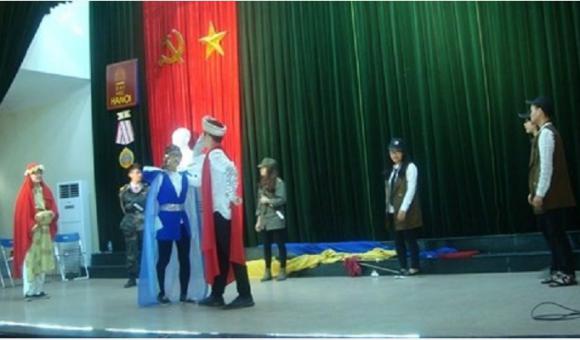
Thanks to a WBI-sponsored project, for the last 4 years students in the Department of French at Hanoi University have been getting to know french Belgian theatre. With the help of master-classes, they can discover even more language and culture.
Half an hour before the performance of the comedy Amphitrychou begins, the grand amphitheatre at Hanoi University is filling up: audience members, students in the French Department, lecturers, and representatives of the Wallonie-Bruxelles delegation in Hanoi take every seat.
To be able to act with confidence on a public stage, the students – amateur actors from the Department of French at Hanoi University – have been rehearsing since last September, directed by Céline Mariage, lectrice in French language and literature from Wallonie-Bruxelles International, and Delphine Bougard, drama expert and founder of the Compagnie de la Sonnette in Brussels.
As well as giving them a deep insight into the play’s content, the experts from Wallonie-Bruxelles have been helping the students to master acting techniques, developing their stage presence and enunciation to help them feel at ease in front of an audience.
Céline Mariage is truly impressed. “They’ve learnt a great deal since we began the workshop in September. And we’ve learnt to express ourselves, keep eye contact and not be afraid of the audience, raise our voices, express ourselves through the body. So, body and voice. We’re really happy because they’ve worked hard on that and with their French, too, they’ve really improved,” she told us.
Directed by Delphine Bougard, Amphitrychou revisits the links between Greek myth and humanity, with a modern-day and Vietnamese twist. The play, loosely based on the work by the francophone Belgian playwright Paul Emond, weaves together drama, pantomime and dance.
The show is the result of a collaboration between Wallonie-Bruxelles and the University of Hanoi which has been running for four years.
According to Anne Lange, delegate from Wallonie-Bruxelles in Hanoi, “The aim of this theatre workshop is of course to allow the university students to improve their French, while at the same time discovering francophone and Belgian literature and authors more generally.” She tells us that this is one of the best ways of helping students appreciate the French language through a work of art.
In the four years since the theatre workshop for francophone students was established, Wallonie-Bruxelles and the University of Hanoi have put on four plays, with around fifty student actors. The workshop is run by Céline Mariage. Every year Wallonie-Bruxelles sends a theatre professional to direct the play. In the first year, it was the writer Nicolas Ancion and in the second and third years, the director Michel van Loo, from the Guimbarde theatre in Charleroi. This year, it is director Delphine Bougard.
As well as improving their oral expression and accuracy in French, taking part in the performance allows students to immerse themselves in an academic artistic environment.
It is the first time first-year student Lâm Duy Duc has taken part in a show like this. “Acting in this play has been a wonderful experience and I’ve noticed an improvement in my spoken fluency,” he told us.
As well as an improvement in spoken fluency and vocabulary, first-year student Vu Minh Tuân has gained new knowledge of Europe, and Belgium in particular. He’s very happy: “It’s really interesting!”
These Belgian francophone plays allow the audience, and above all the students at Hanoi University, to immerse themselves in a francophone atmosphere.
The plays are performed on International Francophonie Day, as well as at festivals, and even during European Literature Week.
As well as this workshop, Wallonie-Bruxelles runs many other cultural exchange projects with Vietnam, like directorship training for students at the Hanoi Academy of Theatre and Cinema; media engagement, and university teaching, to ensure the French language has a role in the present and, above all, the future.
Thu Trang/VNA (source: vietnamplus.vn)